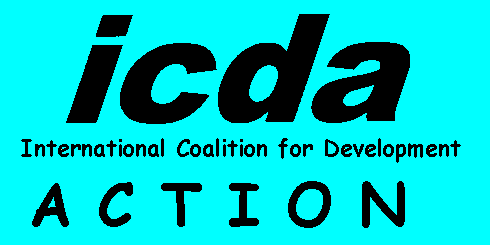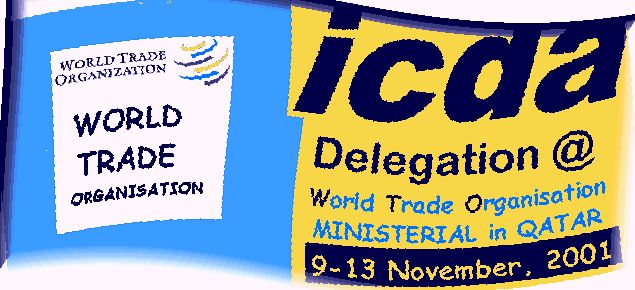
This site is best viewed with
| ICDA LATEST |
ICDA Latest News
Programme areas
ICDA History
| ICDA MEMBERS |
Current Members
| WTO IMPACT LIST |
Subscribe Here
What do you think?
| CENNT |
Latest News
IWGGT (in construction)
| PUBLICATIONS |
Latest ICDA Journal (in construction)
Latest ICDA Update (in construction)
| VACANCIES |
Internship
Book Keeper/Part time administrative Assistant
| HELP |
FAQ's
About Us
Contact Us

| BACKGROUND >> GATS IS NO SERVICE TO ANYONE |
| By: Barry Coates |
"Gats does not, as Mr {Mike}Moore claims, allow countries to choose only the sectors they want to open up."
Barry Coates
Monday March 19, 2001
The Guardian
Don't sign any contract until you've read the small print. This is especially true for international trade agreements that affect the lives of millions. Their core provisions are hidden behind a welter of acronyms and legal phrases. In the Guardian debate on February 26, Mike Moore, director general of the World Trade Organisation, said that concerns about Gats, or the general agreement on trade in services, were "lies and distortions". Let's look at the fine print.
Gats aims for "progressive liberalisation". What does this mean? Governments agree to remove more and more regulations or restrictions on foreign service firms. Although there are temporary exceptions allowed, the whole thrust of Gats is to remove them. And it is a one-way process. WTO officials have described Gats as a means to lock in liberalisation and make it irreversible.
At a time when governments are questioning the impact of gung-ho liberalisation, this is a dangerous provision. Gats would lock them into these policies, denying the opportunity for democratic debate on alternative policies.
Even countries that have considerable experience in regulating service sectors are seeing the dangers of ill-conceived privatisation. Gats would mean that even public opinion or a change in government would not be able to reverse failed policies. It is a denial of democratic rights.
Gats does not, as Mr Moore claims, allow countries to choose only the sectors they want to open up. Present negotiations aim to change the structure of Gats so that rules on one sector apply to related sectors. Gats also has provisions that apply to all service sectors. The rules on domestic regulation aim to remove "unnecessary restrictions" on trade and investment in services. Who decides what is unnecessary? The WTO.
Mr Moore claims there is adequate protection under Gats for health and the environment. Yet WTO rules have already been used to overturn restrictions on trade to protect dolphins and turtles, block tobacco and hormone-injected beef imports and support Caribbean banana farmers.
What are the criteria applied by the WTO? This is the subject of talks that recommence this month. Negotiators have rejected a broad definition of "necessary to protect the public interest". The criterion already included is that any measure must be "no more burdensome than necessary" on foreign service providers. That could be used to challenge national and local government rules.
At its core, Gats gives foreign firms rights that are elevated above other aims. As the European commission has said: "Gats is not just something that exists between governments. It is first and foremost an instrument for the benefit of business."
Mr Moore is right to say Gats excludes services supplied by governments. But Gats does include those services supplied commercially or in competition with the private sector. This describes an increasingly large proportion of "public" service sectors.
More broadly, he suggests that WTO members are eager to negotiate on Gats. But few poor countries have the capacity to get a good deal. And they are likely to make commitments under Gats that are not in their long-term interest as a price for reform of the EU's common agricultural policy. The priority for the WTO must be to fix existing unfair agreements and negotiating processes.
Mr Moore's claims of the vast benefits of liberalisation are a based on trickle-down economics. More evidence would be helpful. Developing nations have been calling for a full assessment of the experience from services liberalisation in the past. It hasn't been done.
Unfair rules that prioritise the interests of firms are a recipe for exploitation. A strong campaign on Gats is building around the world. A motion on it in the Scottish parliament is supported by most MSPs, and 150 Westminster MPs have signed a motion. Last week, the international development committee called for an independent commission on Gats. If Mr Moore can't read the fine print, it is fortunate for democracy there are others who can.
* Barry Coates is director of the World Development Movement
Guardian Unlimited © Guardian Newspapers Limited 2001
Please click here to go back to WTOMC Page
Copyright ©E.K.BENSAH II PRODUCTIONS. 1998-2001